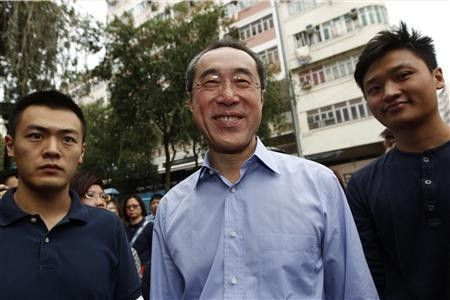Tang confirms bid to be Hong Kong's next leader

Hong Kong's former number two official Henry Tang on Saturday confirmed his bid to become the financial hub's next chief executive, brushing off a scandal over marital infidelity that tarnished his public image.
An experienced administrator and textiles tycoon, Tang is seen as the frontrunner, having been long groomed by senior Chinese officials to take over the reins of the former British colony from bow tie-sporting Donald Tsang.
I have no doubt that we will face other challenges in the future so Hong Kong needs a leader who's able to galvanize the population, Tang told reporters.
Since reverting to Chinese rule in 1997, Hong Kong has played a largely economic mediation role as a capital-raising hub and major offshore yuan center for China.
Politically, its moves toward full democracy make it a petri dish of reform for China's Communist leaders, who have exerted behind-the-scenes control over local politics.
Despite the married Tang's admission that he had strayed in his love life following media reports of multiple affairs and awkward appearances with reporters, analysts said he remained Beijing's favored candidate. He enjoys strong support from the city's powerful civil service and affluent business community.
Unless there are other revelations or new scandals, I don't think it will affect Tang's chances that much, said political scientist Ma Ngok.
But he added: A lot of people doubt his ability and don't think he'll bring a lot of changes to Hong Kong, so if we need a more fundamental change or solution I don't think he'll be a very good choice.
Tang, 59, is a wealthy princeling of Hong Kong's elite.
His father, Tang Hsiang-chien, a textile industrialist from Shanghai, was branded a rightist during Mao Zedong's Cultural Revolution but was later rehabilitated. He fostered close ties to former president and fellow Shanghainese Jiang Zemin.
FAST TRACK
The father of four was fast-tracked into the echelons of government in 2002, serving as commerce and then financial secretary, before becoming chief secretary, or the head of the civil service, in 2007.
Tang is also considered one of Asia's top wine collectors with extensive cellars and a passion for lavish tastings.
Despite Beijing's promise to grant Hong Kong full democracy, its people have no direct say in their leader, to be chosen next March by a 1,200-member election committee stacked with Beijing loyalists.
Tang is likely to face a challenge from government adviser and surveyor Leung Chun-ying, seen by some as a brasher, but potentially more visionary leader than Tang.
Hong Kong's chief executives generally lack the influence of China's leaders, but a poor leader can still unnerve China.
The first post-handover administration of gaffe-prone Tung Chee-hwa stoked resentment and a mass 2003 street protest that analysts said caused Beijing to force him from office.
Tang's congenial and accommodating administrative style, however, sometimes belies a harder edge.
During an August visit by China's Vice-Premier Li Keqiang, a
security clampdown triggered claims of civil rights violations that Tang dismissed as complete rubbish. That sparked a public and media backlash and reinforced perceptions he would be a yes-man for China.
© Copyright Thomson Reuters {{Year}}. All rights reserved.





















